
Whether it’s 1813 or 2024, you have to be on the lookout for warning signs on the dating—or marriage—market. This is part of what makes Bridgerton so incredibly addictive: What better way to kill time on a Sunday night than to psychoanalyze the Regency-era upper class?
On the surface, the Bridgertons are wealthy, well-educated gentlemen and ladies who make them some of the most sought-after members of the upper class. But they’re also assholes. Daphne’s charming demeanor is immediately overshadowed by her shockingly over-the-top behavior in bed. Colin’s insecurities about his middle child lead him to act in ways that hurt those closest to him. And Anthony, in particular, needs to get a grip on himself.
Revolving around the Bridgerton family is an orbit of other players who carry their own emotional baggage, from the feisty Kate Sharma to the self-proclaimed introvert Penelope Featherington. And, lest we forget, the Bridgerton cinematic universe also includes the origin story of Queen Charlotte and King George. Even for royalty, romance isn’t that easy.
With the first part of the third season just hitting Netflix, it was only a matter of time before I figured out how to rank all the Bridgerton characters. My qualifications? One, I spend more time thinking about fictional characters than anyone in their late 20s should; and two, I’ve been to therapy (Simon, Duke of Hastings, take note!).
Without further ado, here is my official Bridgerton ranking, based on a thorough examination of each character’s most glaring red flags—and sometimes, even green flags.
Daphne has a boundary problem, in that she doesn’t respect them. Let’s set aside for a second that Daphne betrayed Simon’s trust by going through his things to discover a painful story about his father that he wasn’t ready to talk about. That trust was permanently severed when she sexually assaulted Simon by forcing him to ejaculate inside her—despite his vehement objections to her actions. Daphne’s apologists will cry, “This is a historical romance,” or “Daphne just discovered what sex was five seconds ago.” But do those excuses really change the narrative? Sure, this is a historical romance, but 18th-century England didn’t have sparkly corsets, cinched waists, or a multi-faceted court. If the Shondaland-directed series can take creative liberties with those incongruities, why not apply the same standards when it comes to modern-day notions of consent? And, besides, is there really no other way for Daphne to understand what Simon really meant when he said he “can’t” have children? Maybe by, I don’t know, just talking?
Season two is my favorite part of Bridgerton, so it pains me to put Anthony second from the bottom on this list. But the truth remains. Anthony spends most of his screen time playing a nasty, arrogant, domineering misogynist. In season one, his inability to consider the opinions and wishes of his mother and Daphne nearly brought his entire family down. He also emotionally dumps Siena, only to turn around when he sees her with another man who actually wants to satisfy her desires. Season two’s version of Anthony isn’t much better. His hunt for the viscount’s wife exposes his primitive perception of women, as he sees most teenage girls as a monolithic mass of idiots whose sole job is to raise his future children. At the same time, he demands perfection from them, despite his own deep imperfections.
Any man who stays in relationships with other men who indulge in toxic masculinity is not a real man to me. You might be inclined to say that Colin isn’t responsible for the things his friends say or do, but it’s clear to me that their antics have seeped into his subconscious, fueling the same insecurities and cruelty that misogynists foster on Reddit or QAnon forums. It’s not just the way he sees Penelope as a potential bride that gets a few laughs in season two. As seen in the trailers for the second half of season three, Colin now also has trouble envisioning his place in the life of a woman who doesn’t need a man to take care of her. “What use am I to you?” he shouts at Penelope, in the tone of a broken-hearted man crying about being castrated. Your middle child mentality is showing, Colin, and I don’t like it!
Eloise, we get it. You don’t like other girls. For all your rhetoric about feminism and gender equality, the middle daughter